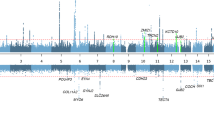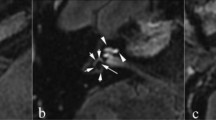Abstract
The COCH gene is the only gene identified in man that causes autosomal dominantly inherited hearing loss associated with vestibular dysfunction. The condition is rare and only five mutations have been reported worldwide. All affected families showed a similar progressive hearing loss and vestibular dysfunction. Since Meniere's disease-like symptoms have also been described in some families, it was suggested that COCH mutations might be present in some patients diagnosed with Meniere's disease. In this study, using a Japanese population, we performed a COCH mutation analysis in 23 patients from independent families with autosomal dominant hearing impairment, four of whom reported vestibular symptoms, and also in 20 Meniere's patients. While a new point mutation, A119 T, was found in a patient with autosomal dominant hearing loss and vestibular symptoms, no mutations were found in the Meniere's patients. Like all other previously identified COCH mutations, the mutation identified here is a missense mutation located in the FCH domain of the protein. The current mutation is located in close spatial proximity to W117, in which a mutation (W117R) had previously been associated with autosomal dominant hearing loss. Model building suggests that, like the W117R mutation, the A119 T mutation does not affect the structural integrity of the FCH domain, but may interfere with the interaction with a yet unknown binding partner. We conclude that mutations in the COCH gene are responsible for a significant fraction of patients with autosomal dominantly inherited hearing loss accompanied by vestibular symptoms, but not for dominant hearing loss without vestibular dysfunction, or sporadic Meniere's disease.
Similar content being viewed by others
Log in or create a free account to read this content
Gain free access to this article, as well as selected content from this journal and more on nature.com
or
References
Robertson NG, Lu L, Heller S et al: Mutations in a novel cochlear gene cause DFNA9, a human nonsyndromic deafness with vestibular dysfunction. Nat Genet 1998; 20: 299–303.
de Kok YJ, Bom SJ, Brunt TM et al: A Pro51Ser mutation in the COCH gene is associated with late onset autosomal dominant progressive sensorineural hearing loss with vestibular defects. Hum Mol Genet 1999; 8: 361–366.
Fransen E, Verstreken M, Verhagen WI et al: High prevalence of symptoms of Meniere's disease in three families with a mutation in the COCH gene. Hum Mol Genet 1999; 8: 1425–1429.
Fransen E, Verstreken M, Bom SJ et al: A common ancestor for COCH related cochleovestibular (DFNA9) patients in Belgium and The Netherlands bearing the P51S mutation. J Med Genet 2001; 38: 61–65.
Kamarinos M, McGill J, Lynch M, Dahl H : Identification of a novel COCH mutation, I109N, highlights the similar clinical features observed in DFNA9 families. Hum Mutat 2001; 17: 351.
Verstreken M, Declau F, Wuyts FL et al: Hereditary otovestibular dysfunction and Meniere's disease in a large Belgian family is caused by a missense mutation in the COCH gene. Otol Neurotol 2001; 22: 874–881.
Robertson NG, Skvorak AB, Yin Y et al: Mapping and characterization of a novel cochlear gene in human and in mouse: a positional candidate gene for a deafness disorder, DFNA9. Genomics 1997; 46: 345–354.
Robertson NG, Resendes BL, Lin JS et al: Inner ear localization of mRNA and protein products of COCH, mutated in the sensorineural deafness and vestibular disorder, DFNA9. Hum Mol Genet 2001; 10: 2493–2500.
Ikezono T, Omori A, Ichinose S, Pawankar R, Watanabe A, Yagi T: Identification of the protein product of the Coch gene (hereditary deafness gene) as the major component of bovine inner ear protein. Biochim Biophys Acta 2001; 1535: 258–265.
Trexler M, Banyai L : Patthy L: The LCCL module. Eur J Biochem 2000; 267: 5751–5757.
Committee on Hearing and Equilibrium guidelines for the diagnosis and evaluation of therapy in Meniere's disease. American Academy of Otolaryngology-Head and Neck Foundation, Inc. Otolaryngol Head Neck Surg 1995; 113: 181–185.
Liepinsh E, Trexler M, Kaikkonen A et al: NMR structure of the LCCL domain and implications for DFNA9 deafness disorder. Embo J 2001; 20: 5347–5353.
Koradi R, Billeter M, Wuthrich K : MOLMOL: a program for display and analysis of macromolecular structures. J Mol Graph 1996; 14: 51–55, 29–32.
Liu XZ, Walsh J, Tamagawa Y et al: Autosomal dominant non-syndromoic deafness (DFNA11) caused by a mutation in the myosin VIIA gene. Nat Genet 1997b; 17: 268.
Akita J, Abe S, Shinkawa H, Kimberling WJ, Usami S : Clinical and genetic features of non-syndromic autosomal dominant sensorineural hearing loss: KCNQ4 is a responsible gene in Japanese. J Hum Genet 2001; 46: 355–361.
Iwasaki S, Harada D, Usami S, Nagura M, Takeshita T, Hoshino T : Association of clinical features with mutation of TECTA in a family with autosomal dominant hearing loss. Arch Otolaryngol Head Neck Surg 2002; 128: 913–917.
Khetarpal U, Schuknecht HF, Gacek RR, Holmes LB : Autosomal dominant sensorineural hearing loss: pedigrees, audiologic findings, and temporal bone findings in two kindreds. Arch Otolaryngol Head Neck Surg 1991; 117: 1032–1042.
Khetarpal U : Autosomal dominant sensorineural hearing loss: further temporal bone findings. Arch Otolaryngol Head Neck Surg 1993; 119: 106–108.
Merchant SN, Linthicum FH, Nadol Jr JB : Histopathology of the inner ear in DFNA9. Adv Otorhinolaryngol 2000; 56: 212–217.
Acknowledgements
We thank the families who participated in the present project. We also thank Ms C Kawashima for technical assistance and Ms AC Apple-Mathews for help in preparing the manuscript. This work is supported by the Ministry of Health and Welfare, Japan (SU), a Grant-in-Aid for Scientific Research from the Ministry of Education, Science and Culture of Japan (SU), the University of Antwerp (GVC), and the Flemish fund for Scientific Research (EF) (GVC).
Author information
Authors and Affiliations
Corresponding author
Rights and permissions
About this article
Cite this article
Usami, Si., Takahashi, K., Yuge, I. et al. Mutations in the COCH gene are a frequent cause of autosomal dominant progressive cochleo-vestibular dysfunction, but not of Meniere's disease. Eur J Hum Genet 11, 744–748 (2003). https://doi.org/10.1038/sj.ejhg.5201043
Received:
Revised:
Accepted:
Published:
Issue date:
DOI: https://doi.org/10.1038/sj.ejhg.5201043
Keywords
This article is cited by
-
AudioGene: refining the natural history of KCNQ4, GSDME, WFS1, and COCH-associated hearing loss
Human Genetics (2022)
-
A systematic review of hearing and vestibular function in carriers of the Pro51Ser mutation in the COCH gene
European Archives of Oto-Rhino-Laryngology (2019)
-
Cochlear involvement in patients with systemic autoimmune rheumatic diseases: a clinical and laboratory comparative study
European Archives of Oto-Rhino-Laryngology (2019)
-
Bi-allelic inactivating variants in the COCH gene cause autosomal recessive prelingual hearing impairment
European Journal of Human Genetics (2018)
-
Distinct vestibular phenotypes in DFNA9 families with COCH variants
European Archives of Oto-Rhino-Laryngology (2016)



